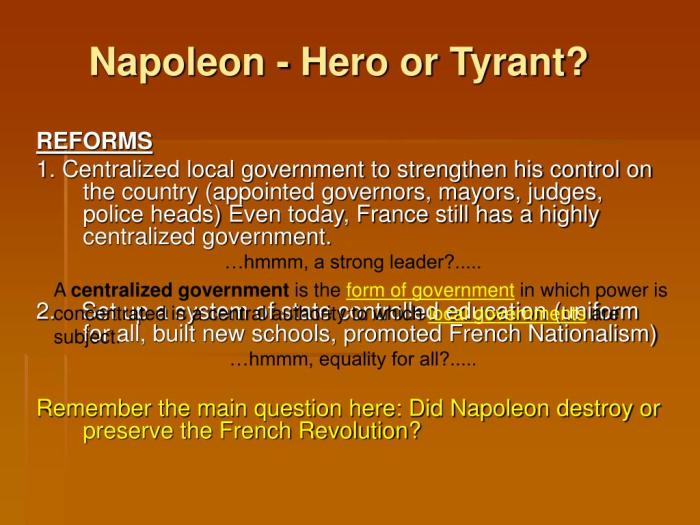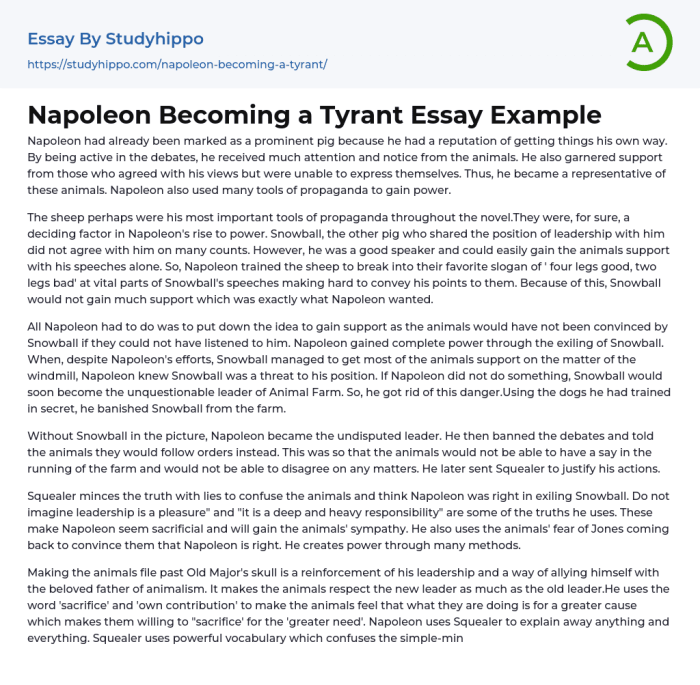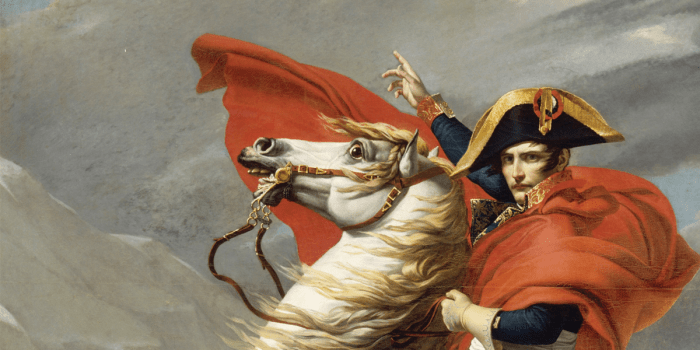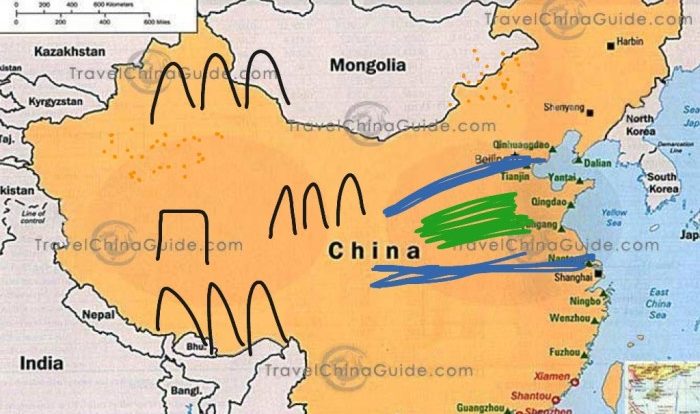Napoleon hero or tyrant essay – Napoleon Bonaparte, a name synonymous with military prowess and ambition, has captivated historians and the public alike for centuries. Napoleon: Hero or Tyrant? Essay delves into the multifaceted legacy of this enigmatic figure, examining his triumphs and failures, his impact on France and Europe, and the enduring questions surrounding his true nature.
From his groundbreaking military strategies to his sweeping reforms, Napoleon left an indelible mark on the world. This essay explores the complexities of his character, the motivations that drove him, and the consequences of his actions.
Napoleon’s Military Victories and Strategic Genius
Napoleon Bonaparte, the renowned French military leader, left an indelible mark on the world with his extraordinary military prowess. His innovative tactics and strategic brilliance led to numerous decisive victories, shaping the course of European history. This section delves into Napoleon’s military campaigns, highlighting his key battles, leadership qualities, and the factors that contributed to his remarkable success on the battlefield.
Key Battles and Innovative Tactics
Napoleon’s military genius was evident in his numerous battlefield triumphs. The Battle of Austerlitz in 1805 stands as a prime example of his strategic brilliance. Napoleon’s army, outnumbered by the combined forces of Austria and Russia, employed innovative tactics to deceive and outmaneuver their opponents.
By creating the illusion of a weakened center, Napoleon lured the enemy into attacking, only to unleash a devastating counteroffensive that shattered their lines.Another notable victory was the Battle of Jena-Auerstedt in 1806, where Napoleon’s army annihilated the Prussian forces with lightning speed and precision.
His use of concentrated artillery fire and cavalry charges proved devastatingly effective, resulting in a decisive triumph that crippled Prussia’s military might.
Leadership and Training Methods
Napoleon’s military prowess was not solely due to tactical brilliance; his exceptional leadership skills also played a crucial role. He inspired unwavering loyalty and discipline among his troops, fostering a sense of camaraderie and unity. Napoleon’s innovative training methods emphasized speed, mobility, and adaptability, enabling his army to outmaneuver and outfight their opponents.
Technological Advancements and Logistics
Napoleon’s military success was further enhanced by his embrace of technological advancements. He standardized weapons and equipment, ensuring uniformity and efficiency on the battlefield. Additionally, his focus on logistics and supply lines allowed his army to operate effectively even during extended campaigns.
Example of Military Brilliance
One striking example of Napoleon’s military brilliance was his crossing of the Alps during the Italian Campaign in 1796. Despite treacherous terrain and harsh weather conditions, Napoleon led his army over the snow-capped mountains, surprising and outmaneuvering the Austrian forces.
This daring maneuver demonstrated his exceptional leadership, strategic thinking, and the unwavering determination of his troops.
Napoleon’s Domestic Reforms and Legacy in France: Napoleon Hero Or Tyrant Essay

Napoleon Bonaparte, known for his military prowess, also left a lasting impact on France through his domestic reforms. These reforms transformed French society and laid the foundation for modern France’s institutions and legal systems.
The Napoleonic Code
One of Napoleon’s most significant contributions was the creation of the Napoleonic Code, also known as the Civil Code. This comprehensive legal code unified and modernized French law, replacing the complex and often contradictory laws of the pre-revolutionary era. The Napoleonic Code established the principle of equality before the law, abolished feudal privileges, and protected individual rights and property.
Establishment of the Bank of France
Napoleon also played a crucial role in establishing the Bank of France, the country’s central bank. The bank was founded in 1800 to regulate the monetary system, stabilize the currency, and facilitate economic growth. The Bank of France remains a key institution in the French economy today.
Centralized Administrative System
To strengthen his control over France, Napoleon implemented a centralized administrative system. He divided the country into departments, each headed by a prefect appointed by the central government. This system improved efficiency and standardized administration throughout the country.
Impact and Legacy
Napoleon’s reforms had a profound impact on French society. They created a more unified and egalitarian legal system, strengthened the economy, and improved the efficiency of government. These reforms laid the foundation for the development of modern France and continue to shape its institutions and legal framework today.
Napoleon’s Impact on Europe and the World

Napoleon’s military conquests and alliances left an indelible mark on the political map of Europe. His victories shattered the old order of monarchies and paved the way for the rise of nationalism, a sentiment that would shape the continent for centuries to come.
Reshaping the Political Map of Europe
Napoleon’s conquests created new states and redrew the boundaries of existing ones. He established the Confederation of the Rhine, a league of German states that served as a buffer between France and Prussia. In Italy, he created the Kingdom of Italy and the Kingdom of Naples, both ruled by his relatives.
These changes destabilized the European balance of power and sparked conflicts that would continue long after Napoleon’s defeat.
Spread of Revolutionary Ideals, Napoleon hero or tyrant essay
Napoleon’s armies carried the principles of the French Revolution throughout Europe. His conquests introduced ideas of liberty, equality, and popular sovereignty to countries that had long been ruled by absolute monarchs. These ideas inspired liberal movements and revolutions across the continent, leading to the eventual decline of monarchies and the establishment of democratic governments.
Long-Term Consequences
Napoleon’s actions had profound long-term consequences on international relations and global power dynamics. His conquests created a power vacuum in Europe that was filled by new powers such as Prussia and Russia. The Napoleonic Wars also accelerated the decline of the Spanish Empire, paving the way for the rise of the United States as a global superpower.Napoleon’s
Napoleon’s legacy remains a topic of debate, with arguments for both his heroism and tyranny. However, it’s interesting to note that a baseball rolling off a 0.70 m surface demonstrates principles of physics that can also be applied to Napoleon’s rise and fall.
The trajectory of the ball, influenced by gravity and momentum, mirrors the complex interplay of forces that shaped Napoleon’s own destiny, highlighting the delicate balance between power and its consequences.
legacy is complex and controversial. He was a brilliant military commander who reshaped the political landscape of Europe, but his wars also caused immense suffering and bloodshed. His impact on the world is still felt today, in the form of the nation-states that emerged from his conquests and the liberal values that he helped to spread.
Napoleon’s Personal Character and Motivations

Napoleon Bonaparte was a complex and enigmatic figure whose personality and motivations have been the subject of much debate. He was a brilliant military strategist, a charismatic leader, and a ruthless dictator. His rise to power was fueled by his ambition, his self-confidence, and his determination to achieve greatness.
Napoleon’s Personality
Napoleon was a man of contradictions. He was both brilliant and impulsive, charming and ruthless. He had a strong sense of self-confidence and a deep belief in his own destiny. He was also ambitious and driven by a desire for power.
Napoleon’s personality was shaped by his childhood and early experiences. He was born into a poor family on the island of Corsica and was often bullied by his classmates. This experience taught him to be tough and independent. He also developed a strong sense of loyalty to his family and friends.
Napoleon’s Leadership Style
Napoleon was a gifted leader who inspired loyalty and devotion from his followers. He was able to motivate his troops to fight bravely and to achieve victory against overwhelming odds. Napoleon’s leadership style was based on a combination of charisma, discipline, and ruthlessness.
He was able to inspire his followers with his vision of a glorious future and with his belief in their abilities. He also demanded strict obedience and punished those who disobeyed him.
Napoleon’s Personal Ambitions
Napoleon’s personal ambitions were closely intertwined with his political and military goals. He dreamed of conquering Europe and establishing a French empire. He also wanted to be remembered as one of the greatest military commanders in history. Napoleon’s ambitions were driven by a combination of personal vanity and a genuine desire to improve the lives of the French people.
Factors Influencing Napoleon’s Decision-Making
Napoleon’s decision-making was influenced by a variety of factors, including his personality, his experiences, and his political goals. He was a risk-taker who was not afraid to make bold decisions. He was also a pragmatist who was willing to compromise when necessary.
Napoleon’s decisions were often based on his gut instinct and his belief in his own destiny.
Psychological and Emotional Aspects of Napoleon’s Character
Napoleon’s psychological and emotional makeup was complex and contradictory. He was a man of great ambition and self-confidence, but he was also insecure and prone to fits of rage. He was also a deeply emotional man who was capable of great love and compassion.
Napoleon’s psychological and emotional state was often influenced by his physical health. He suffered from a variety of illnesses, including epilepsy, which may have affected his decision-making and his behavior.
Napoleon’s Charisma
Napoleon was a charismatic leader who was able to inspire loyalty and devotion from his followers. He had a magnetic personality and a gift for oratory. He was also able to connect with people on a personal level and to make them feel like they were part of something important.
Napoleon’s charisma was a major factor in his rise to power and in his ability to maintain control over France for over a decade.
Napoleon’s Self-Confidence
Napoleon had a strong sense of self-confidence and a deep belief in his own destiny. He was convinced that he was destined to achieve great things and that he would one day rule the world. Napoleon’s self-confidence was based on his military victories and on his belief in his own abilities.
He was also able to inspire confidence in his followers and to make them believe that they could achieve anything under his leadership.
Napoleon’s Drive for Success
Napoleon was driven by a relentless desire for success. He was determined to achieve greatness and to leave a lasting legacy. He was also willing to take risks and to make sacrifices in order to achieve his goals. Napoleon’s drive for success was a major factor in his rise to power and in his ability to maintain control over France for over a decade.
Napoleon’s Downfall and Legacy
Napoleon’s reign came to an end with his defeat at the Battle of Waterloo in 1815. This defeat marked the collapse of his empire and his exile to the remote island of Saint Helena. Several factors contributed to Napoleon’s downfall, including military mistakes, political miscalculations, and the rise of opposing coalitions.
Military Mistakes
Napoleon made several military blunders that ultimately contributed to his defeat. One of the most significant was his decision to invade Russia in 1812. The invasion was a disaster, with the French army suffering heavy losses due to the harsh Russian winter and the resistance of the Russian people.
Another military mistake was Napoleon’s decision to divide his army into several smaller units during the Battle of Waterloo. This made it easier for the Allied forces to defeat them.
Political Miscalculations
Napoleon also made several political miscalculations that contributed to his downfall. One of these was his decision to crown himself Emperor of France in 1804. This alienated many of his supporters, who saw it as a betrayal of the ideals of the French Revolution.
Another political miscalculation was Napoleon’s decision to impose the Continental System on Europe. This system was designed to block British trade from the continent, but it ultimately failed and caused economic hardship for many European countries.
Rise of Opposing Coalitions
The rise of opposing coalitions also played a significant role in Napoleon’s downfall. After his defeat in Russia, several European countries formed a coalition against him. This coalition included Austria, Prussia, Russia, and Great Britain. The Allied forces were able to defeat Napoleon at the Battle of Waterloo and force him to abdicate.
Legacy
Napoleon’s legacy is complex and controversial. He is remembered as a brilliant military commander who conquered much of Europe. He is also remembered as a ruthless dictator who imposed his will on France and the rest of Europe. However, Napoleon also made some positive contributions to France and the world.
He introduced a new legal code, the Napoleonic Code, which is still in use in many countries today. He also founded the University of France and the Louvre Museum.
Overall, Napoleon was a complex and contradictory figure. He was a brilliant military commander and a ruthless dictator. He made some positive contributions to France and the world, but he also caused a great deal of suffering. His legacy is still debated today.
Expert Answers
What were Napoleon’s most significant military victories?
Napoleon’s victories include the Battle of Austerlitz, the Battle of Jena-Auerstedt, and the Battle of Wagram.
What were some of Napoleon’s key domestic reforms?
Napoleon’s domestic reforms included the Napoleonic Code, the establishment of the Bank of France, and the creation of a centralized administrative system.
How did Napoleon’s actions impact Europe?
Napoleon’s conquests and alliances reshaped the political map of Europe, leading to the rise of nationalism and the decline of monarchies.
